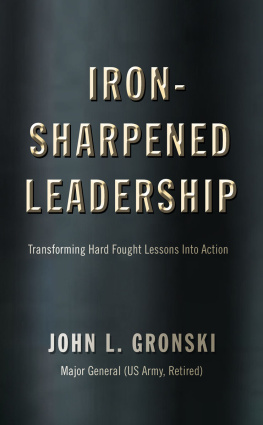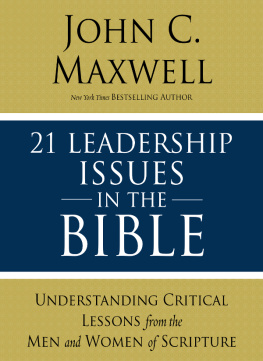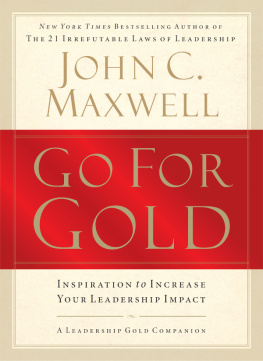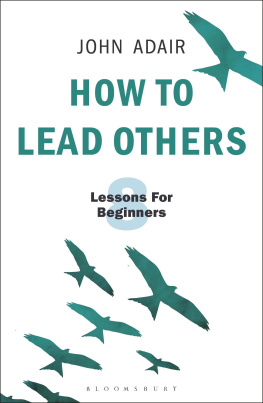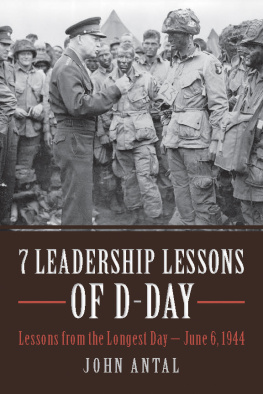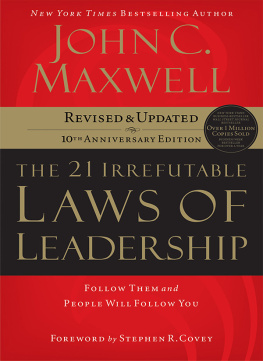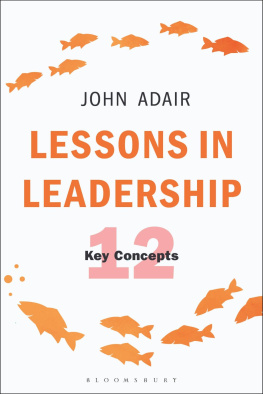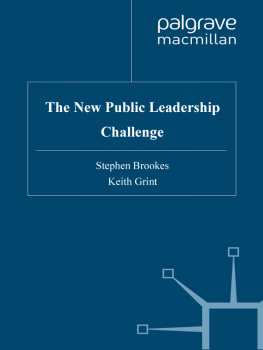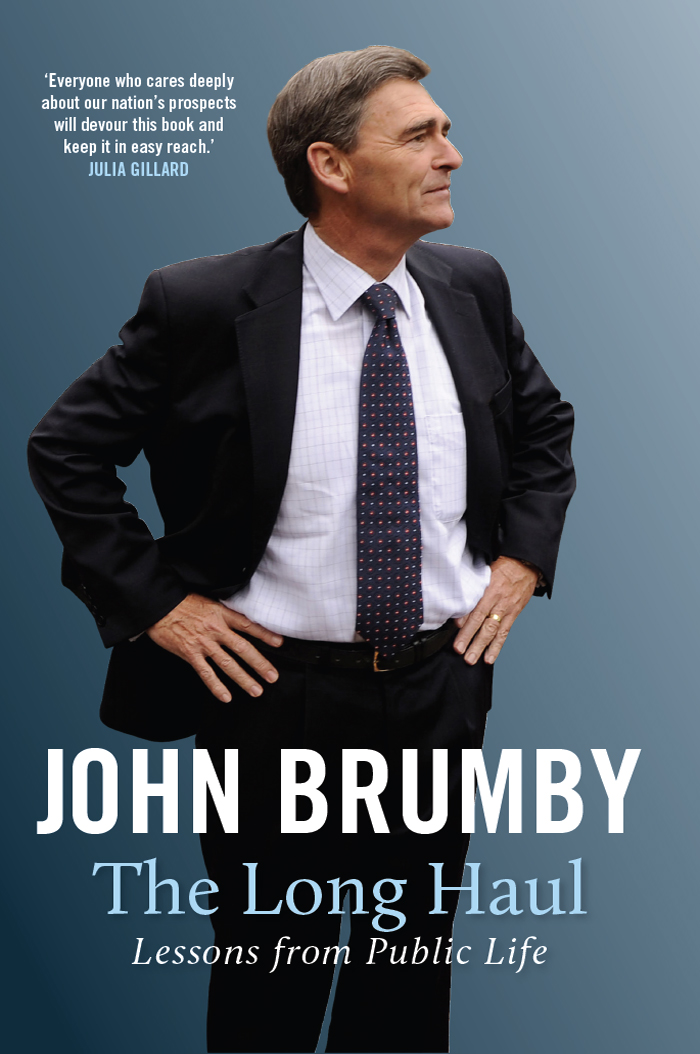John Brumbys encounters with political allies and foes offer textbook coverage of political leadership styles. His own is arguably most appropriate for the contemporary complexities of contemporary governing combining a focus on the future and the global environment, clear-sighted analysis and practical application, preparedness to confront wicked challenges by working with others, humility, compassion and endeavour.
What stands out in this book is John Brumbys commitment to the institutions of government and democracy as a means of improving the well-being of Australians, and his unceasing appetite for reform to ensure that they are fit for purpose in 21st century Australia.
Professor Helen Sullivan, Foundation Director,
Melbourne School of Government
John Brumby was a reforming Treasurer and Premier. He brought great intellect and energy to the task. Victoria was a far more dynamic economy for his efforts. Given the lack of success Australia is currently experiencing in embracing necessary economic reform, this book is a timely and valuable contribution.
Heather Ridout AO
JOHN BRUMBY
The Long Haul
Lessons from Public Life

MELBOURNE UNIVERSITY PRESS
An imprint of Melbourne University Publishing Limited
1115 Argyle Place South, Carlton, Victoria 3053, Australia
mup-info@unimelb.edu.au
www.mup.com.au
First published 2015
Text John Brumby, 2015
Design and typography Melbourne University Publishing Limited, 2015
This book is copyright. Apart from any use permitted under the Copyright Act 1968 and subsequent amendments, no part may be reproduced, stored in a retrieval system or transmitted by any means or process whatsoever without the prior written permission of the publishers.
Every attempt has been made to locate the copyright holders for material quoted in this book. Any person or organisation that may have been overlooked or misattributed may contact the publisher.
Unless otherwise credited, all images have been sourced by the author.
Cover design by Philip Campbell Design
Typeset in Bembo 12/15pt by Cannon Typesetting
Printed in Australia by McPhersons Printing Group
National Library of Australia Cataloguing-in-Publication entry
Brumby, John, 1953 author.
The long haul: lessons from public life/John Brumby.
9780522868531 (paperback)
9780522868548 (ebook)
Includes index.
Brumby, John, 1953
Political leadershipAustralia
AustraliaPolitics and government.
320.994
Contents
Foreword
Elizabeth Brumby
To borrow from the great Samuel Beckett, the end is in the beginning, and yet you go on.
Having observed Australian politics from the perspective of an incidental insider for most of my life, I am convinced that nothing could be truer when it comes to political life today.
By the time an elected representative takes office, they are already fighting to hold on to what they have. Much of what they do will make little difference to an apathetic electorate. And, as my father writes at one point in the following pages, when the tide of public opinion changes, its very difficult, if not impossible, to avoid being swept out with it. Yet candidates for political office do it anyway, never knowing when the ebb and flow of the tide might change.
Ive spent a good portion of my adolescent and early adult life trying to understand why anyone would choose to go into politics at all. Faced with intense media scrutiny, an often hostile public and opinion polling that acts as a de facto electoral process, politics is not a career one enters into lightly. Its tough, often thankless, and it tends to work out only if one is willing to make great sacrifices for the cause. I have no doubt my father made sacrifices. Growing up in Bendigo, when he was the federal Member and then a chief of staff in the Hawke and Keating Governments, my sister and I used to run outside into the backyard every time we heard a plane overhead. Wed jump up and down and wave at the plane, hoping Dad might be in it, and that he might catch a glimpse of us from his window seat.
My father has always worked extraordinarily hard. For him, work ethic is a prized quality, one he values more than any other. Even now, he lists the part-time jobs he had as a student on his CV with pride: carting hay on his parents farm, selling shoes, cleaning factories and pumping petrol. During the nineties, after we had moved to Melbourne and he had taken on the role of Opposition Leader in Victoria, Dad worked tirelessly for the party and the state. He spent years fighting battles that seemed never to endagainst Jeff Kennett; sometimes against his own party; sometimes against the press. After Labor won power in Victoria and he became Treasurer and then Premier, the workload intensified, and so too did the public pressure.
Dad has always been good at keeping on going when the going got tough. He has the ability to see the humour in (most) situations: his favourite mixed metaphor is that theres always light at the end of the tightrope. To relax, he would listen to music, from Mahler to Midnight Oil, or spend time outdoorsusually walking or working on projects at the farm.
Inevitably, some aspects of his work took a greater toll than others. On 7 February 2009 I was in New York. Id only just arrived: before that, Id been at home in Melbourne, working at a local cinema all summer in the blistering heat. Late on Saturday nightSunday evening Melbourne timeI received a text message from my mother. The message said it had been a very bad weekend in Victoria, with many people killed in fires across the state.
I remember sitting in an Internet caf off Times Square the following day, watching a clip of Dad overcome with emotion and struggling to speak on the evening news. The whole world was watching, unable to avert their eyes from the devastation that was Black Saturday. I had only ever seen my father like that once or twice before in my life. This was a person I knew, but one who was not often seen by the public: a person of compassion, warmth and great humility (despite an often brusque exterior). During his time in politics, it was these qualities that his staff and colleagues were quick to point out to any detractors. A true statesman, one of his staff once told me. Your Dad is a true statesman.
As an observer, I have also witnessed the impact others have had on my fathers conduct in public life. From his father, my grandfather Malcolm, he inherited his work ethic, courtesy and respect for others. From his mother, my grandmother Alison, his ability to engage with people from all walks of life. From them both, an openness to new ideas and a love of the landsomething he shares with my mother.
The end is in the beginning, and yet you go on. In her autobiography, Julia Gillard recalls a phone conversation she had with Dad on the night of the 1999 state election, late in the evening. We spoke for ages, both of us sipping red wine as we did so, she writes, but the real taste in our mouths was that intricate bittersweet flavour which is the essence of politics. Just over a decade later, not too long after Julia Gillard became Australias first female prime minister, Labors narrow and unexpected loss in November 2010 came as a blow to all of us. It was a deeply disappointing end to what had been, personally, for Dad, a very difficult year; a year in which his father died unexpectedly just eight weeks before the electionbut a year that was briefly lightened by Collingwood winning their first premiership since 1990.



